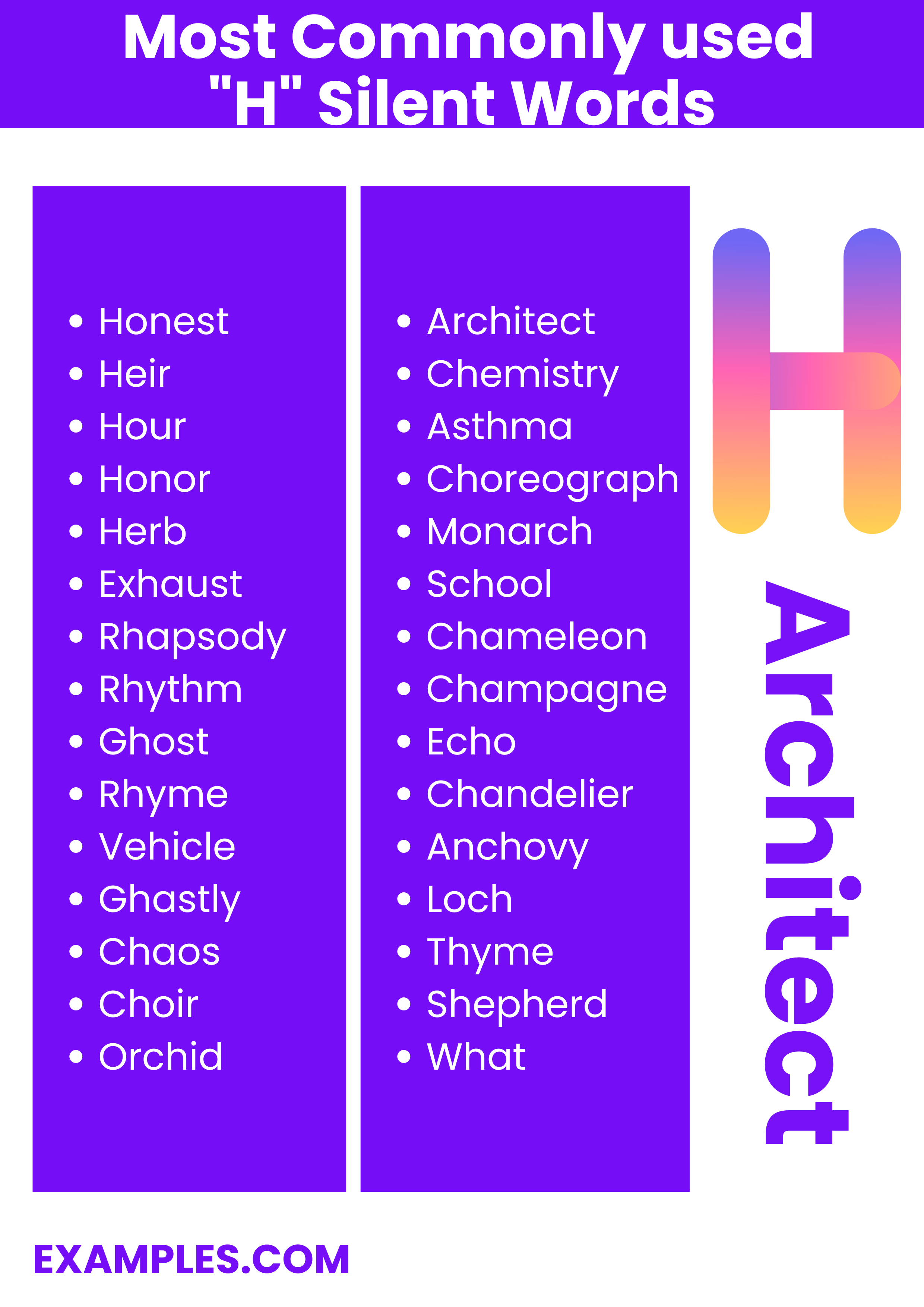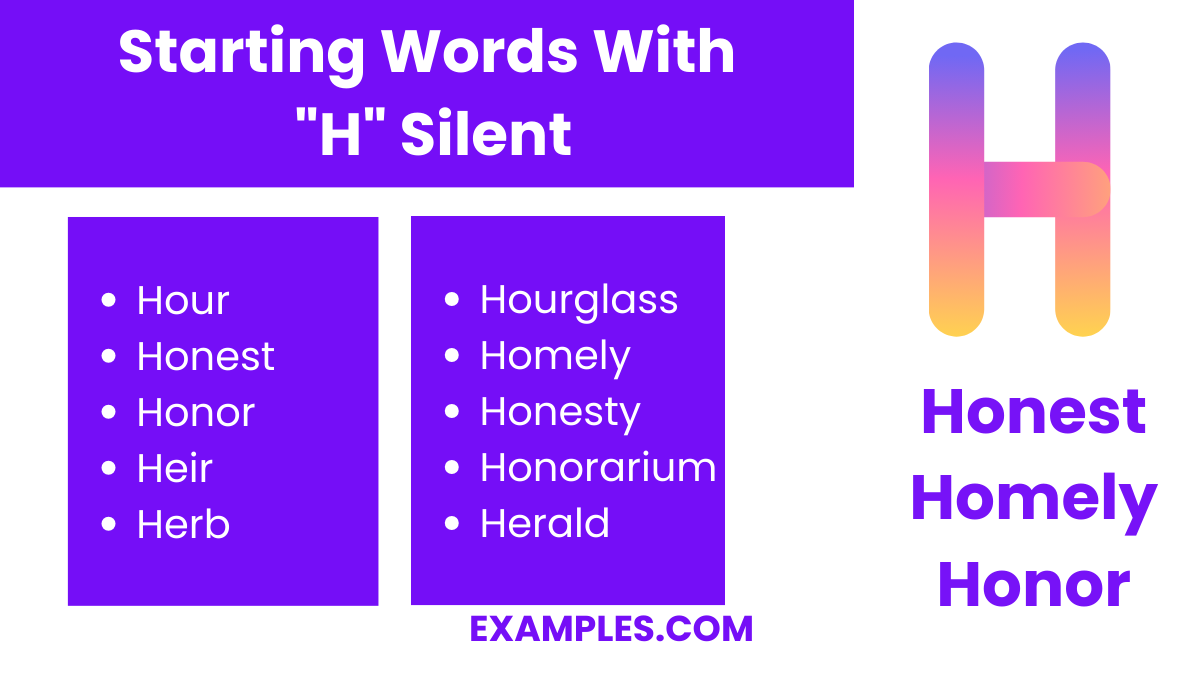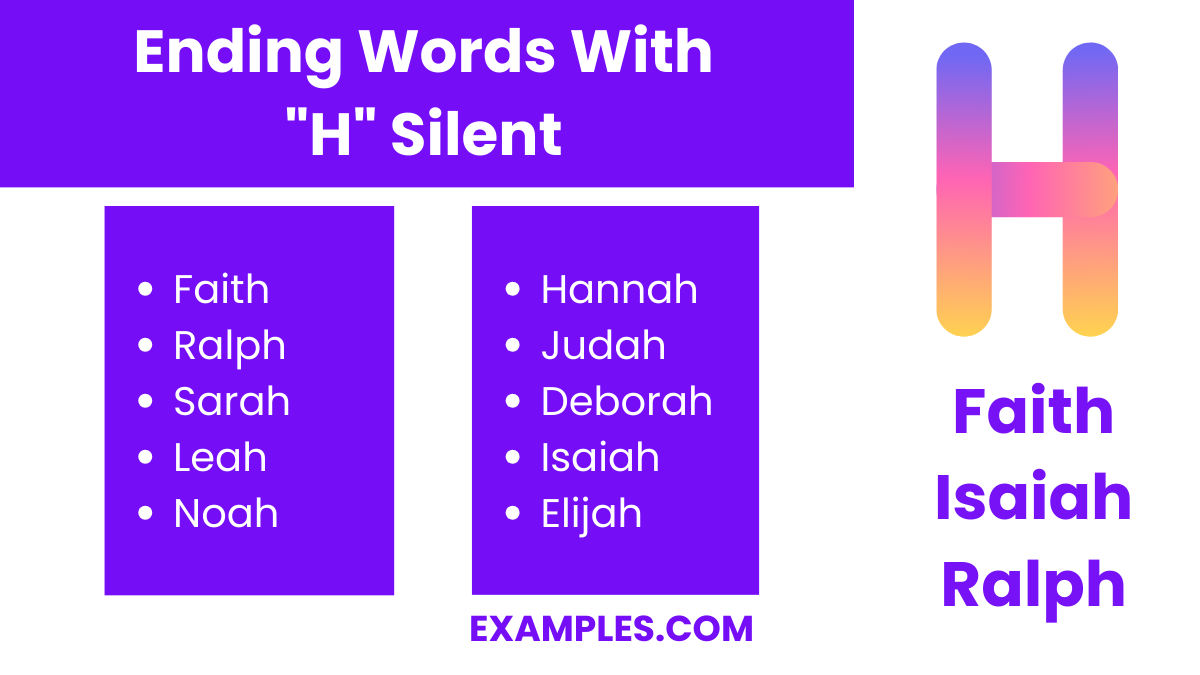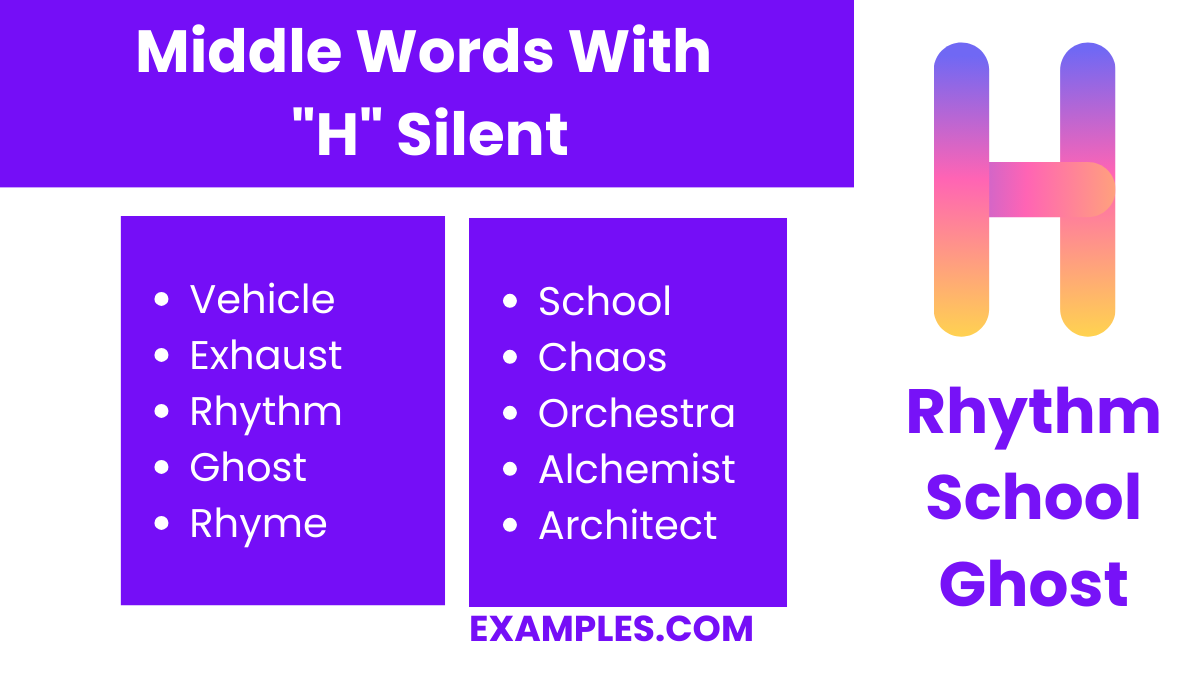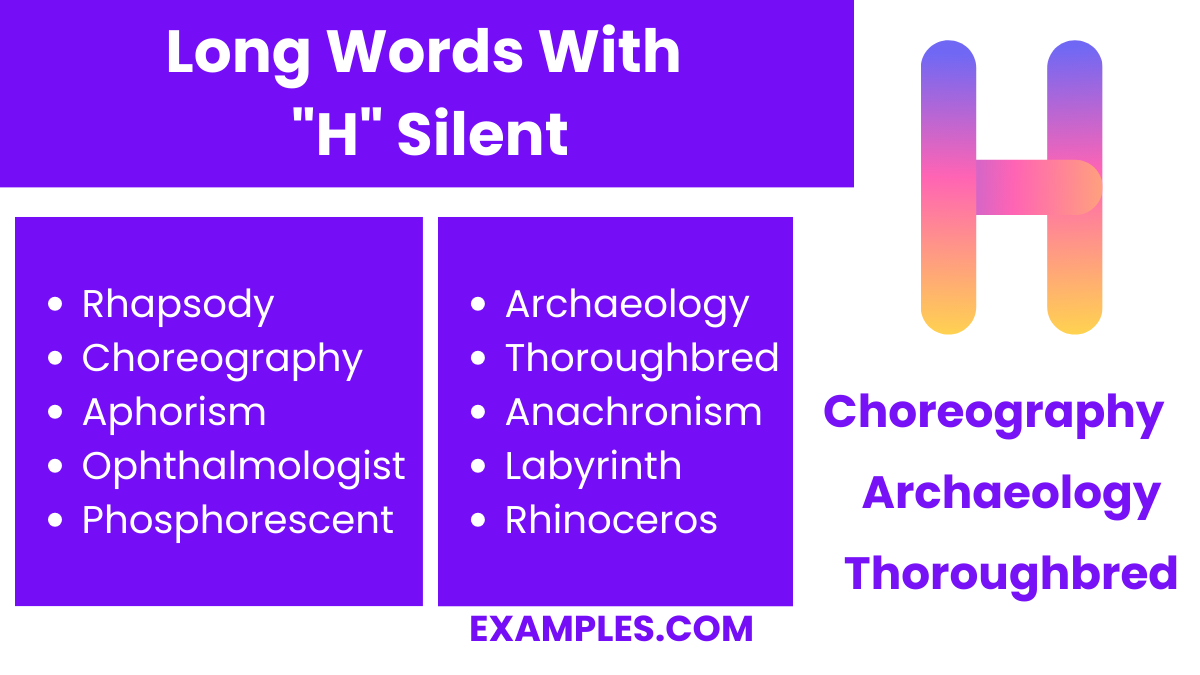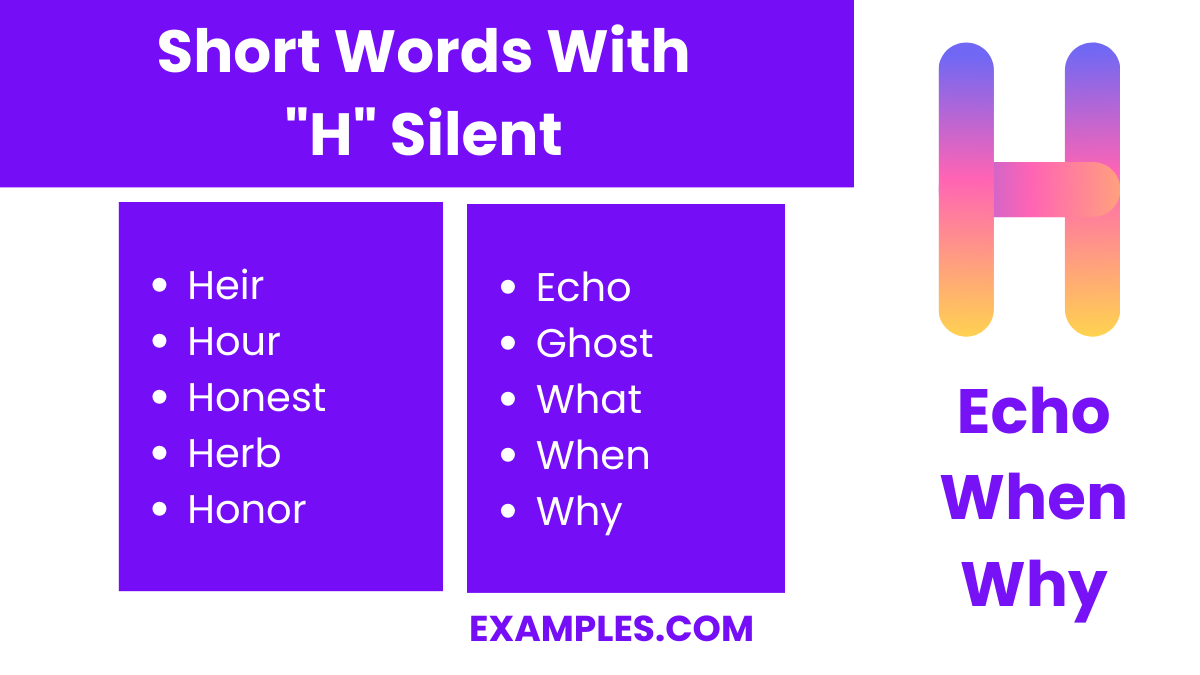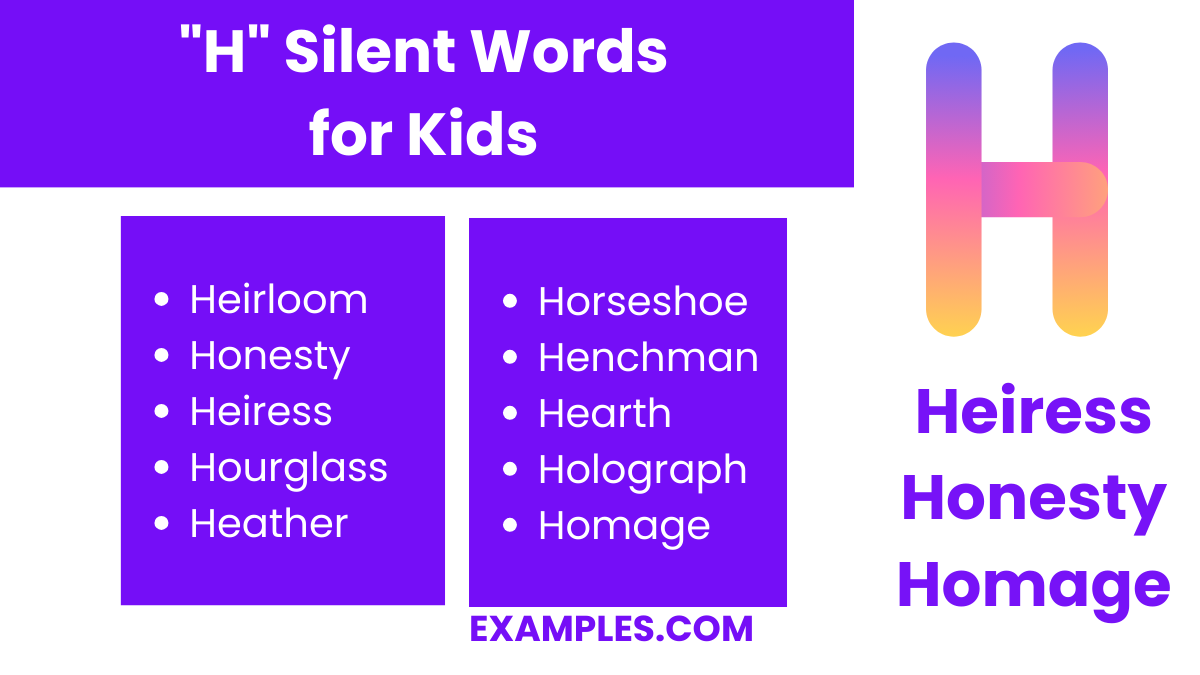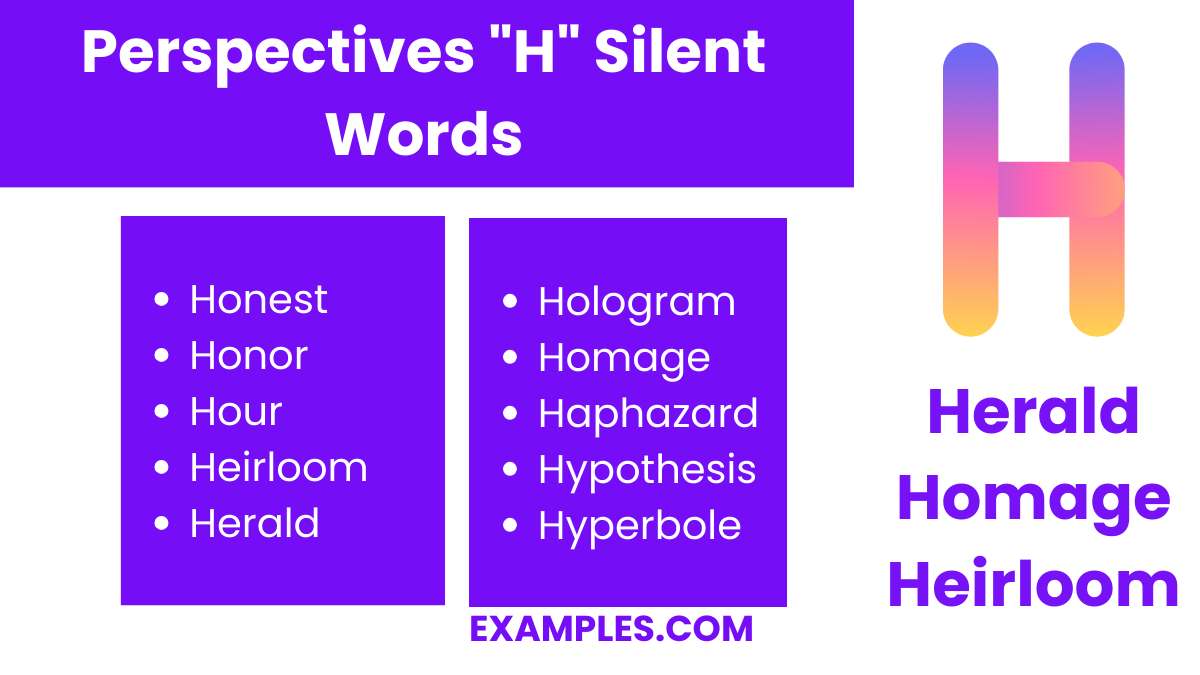“H” Silent Words
The silent ‘H’ in English words often tiptoes through the language, unseen in its sound but impactful in its presence. This linguistic peculiarity invites learners and aficionados alike into a nuanced world where pronunciation defies the expected. From historical remnants to borrowed elegance from other languages, silent ‘H’ words enrich English, offering a silent nod to the complex tapestry of phonetics. Embracing these words not only polishes one’s pronunciation but also deepens appreciation for the language’s diverse influences and evolving nature.
Download Most Commonly Used H Silent Words - PDF
30 Most Commonly used “H” Silent Words
Embark on a linguistic journey through the realm of silent “H” words, a fascinating aspect of English where the ‘H’ remains unspoken, adding a layer of subtlety and nuance to the language. This silent characteristic, especially prevalent in daily use English words, often reflects the language’s rich history and etymological influences, challenging speakers and learners to attune their pronunciation skills closely. Mastering these words can significantly enhance one’s understanding of English phonetics, offering insights into the silent dynamics that shape the language’s pronunciation and texture, and seamlessly integrating into everyday communication.
| Honest | [ˈɒnɪst] | Heir | [ɛər] | Hour | [aʊər] |
| Honor | [ˈɒnə(r)] | Herb | [ɜːb] | Exhaust | [ɪɡˈzɔːst] |
| Rhapsody | [ˈræpsədi] | Rhythm | [ˈrɪðəm] | Ghost | [ɡoʊst] |
| Rhyme | [raɪm] | Vehicle | [ˈviːɪkl] | Ghastly | [ˈɡɑːstli] |
| Chaos | [ˈkeɪ.ɒs] | Choir | [ˈkwaɪə(r)] | Orchid | [ˈɔːrkɪd] |
| Architect | [ˈɑːrkɪtɛkt] | Chemistry | [ˈkɛmɪstri] | Asthma | [ˈæzmə] |
| Choreograph | [ˈkɔːriəɡræf] | Monarch | [ˈmɒnək] | School | [skuːl] |
| Chameleon | [kəˈmiːliən] | Champagne | [ʃæmˈpeɪn] | Echo | [ˈɛkəʊ] |
| Chandelier | [ˌʃæn.dəˈlɪə(r)] | Anchovy | [ˈæntʃəvi] | Loch | [lɒx] |
| Thyme | [taɪm] | Shepherd | [ˈʃɛpərd] | What | [wɒt] |
Starting Words With “H” Silent
Dive into the intriguing world of English where the silent ‘H’ at the beginning of words mystifies pronunciation, making them fascinating subjects for linguistic exploration. These words, often of French origin, challenge learners to rethink how letters and sounds interact, providing a rich teaching opportunity for educators to delve into language history and phonetics. Enhance your curriculum with these examples, perfect for engaging students in the subtleties of English pronunciation, especially when paired with rhyming words that can make learning both effective and enjoyable, fostering a deeper understanding and appreciation of linguistic nuances.
- Hour [aʊər] – A period of time equal to sixty minutes.
- Honest [ˈɒnɪst] – Free of deceit; truthful and sincere.
- Honor [ˈɒnər] – High respect; esteem.
- Heir [ɛər] – A person legally entitled to the property or rank of another on that person’s death.
- Herb [ɜːrb] – Any plant with leaves, seeds, or flowers used for flavoring, food, medicine, or perfume.
- Hourglass [ˈaʊərɡlæs] – A sandglass used to measure the passage of an hour.
- Homely [ˈhoʊmli] – Plain or unattractive in appearance, often used to describe a cozy and comfortable atmosphere.
- Honesty [ˈɒnɪsti] – The quality of being honest.
- Honorarium [ˌɒnəˈreəriəm] – A payment given for professional services that are rendered nominally without charge.
- Herald [ˈhɛrəld] – An official messenger bringing news.
Ending Words With “H” Silent
The silent ‘H’ at the end of words often goes unnoticed, yet it holds historical and phonetic significance, making these terms excellent tools for teaching nuanced aspects of English. These words can serve as a gateway to discussions about language evolution, regional dialects, and the silent letters that lurk within the language, providing students with a deeper understanding of English’s rich tapestry, especially when exploring singular & plural words that highlight variations in pronunciation and spelling across different contexts.
- Faith [feɪθ] – Complete trust or confidence in someone or something.
- Ralph [ræf] – A male given name.
- Sarah [ˈsɛərə] – A female given name.
- Leah [ˈliːə] – A female given name.
- Noah [ˈnəʊə] – A male given name.
- Hannah [ˈhænə] – A female given name.
- Judah [ˈdʒuːdə] – A male given name, also a historical region of ancient Palestine.
- Deborah [ˈdɛbərə] – A female given name.
- Isaiah [aɪˈzaɪə] – A male given name, also one of the major prophets in the Hebrew Bible.
- Elijah [ɪˈlaɪdʒə] – A male given name, associated with a Hebrew prophet in the Old Testament.
Middle Words With “H” Silent
Words with a silent ‘H’ nestled in the middle, such as in some compound words, offer a unique pronunciation challenge, presenting an excellent opportunity for educators to focus on listening skills and the intricacies of spoken English. These words, often overlooked, can enrich students’ vocabulary and understanding of language dynamics, making them valuable additions to any lesson plan focused on advanced language skills. Emphasizing such compound words in teaching materials can further enhance learners’ grasp of English pronunciation and spelling nuances.
- Vehicle [ˈviːɪkl] – A thing used for transporting people or goods.
- Exhaust [ɪɡˈzɔːst] – To drain of strength or energy.
- Rhythm [ˈrɪðəm] – A strong, regular repeated pattern of movement or sound.
- Ghost [ɡoʊst] – An apparition of a dead person.
- Rhyme [raɪm] – Correspondence of sound between words or the endings of words.
- School [skuːl] – An institution for educating children.
- Chaos [ˈkeɪɒs] – Complete disorder and confusion.
- Orchestra [ˈɔːrkɪstrə] – A large group of instrumentalists playing together.
- Alchemist [ˈælkɪmɪst] – A person who practices alchemy.
- Architect [ˈɑːrkɪtɛkt] – A person who designs buildings and in many cases also supervises their construction.
Long Words With “H” Silent
Embark on a linguistic adventure with long, difficult words featuring the silent ‘H’, a fascinating characteristic that adds depth and complexity to English pronunciation. These words, often with roots in various languages, provide a rich opportunity for educators to explore the intricacies of English phonetics with their students. Incorporating these challenging terms into lessons can enhance vocabulary, improve pronunciation skills, and spark curiosity about the history and evolution of language.
- Rhapsody [ˈræpsədi] – An effusively enthusiastic or ecstatic expression of feeling.
- Choreography [ˌkɒriˈɒɡrəfi] – The sequence of steps and movements in dance or figure skating.
- Aphorism [ˈæfərɪzəm] – A pithy observation that contains a general truth.
- Ophthalmologist [ˌɒfθælˈmɒlədʒɪst] – A specialist in the branch of medicine concerned with the study and treatment of disorders and diseases of the eye.
- Phosphorescent [ˌfɒsfəˈresənt] – Exhibiting phosphorescence (the property of emitting light without noticeable heat).
- Archaeology [ˌɑːkiˈɒlədʒi] – The study of human history and prehistory through the excavation of sites and the analysis of artifacts and other physical remains.
- Thoroughbred [ˈθʌrəbred] – A horse of pure breed, especially one bred for racing.
- Anachronism [əˈnækrənɪzəm] – A thing belonging or appropriate to a period other than that in which it exists, especially a thing that is conspicuously old-fashioned.
- Labyrinth [ˈlæbərɪnθ] – A complicated irregular network of passages or paths in which it is difficult to find one’s way; a maze.
- Rhinoceros [raɪˈnɒsərəs] – A large, heavily built plant-eating mammal with one or two horns on the nose and thick folded skin.
Short Words With “H” Silent
Introducing short words with a silent ‘H’ is an excellent way for educators to engage young learners in the nuances of English pronunciation. These words, while brief, offer a window into the diverse influences on English and serve as a foundation for developing accurate pronunciation skills in a fun and accessible manner.
- Heir [ɛər] – A person legally entitled to the property or rank of another on that person’s death.
- Hour [aʊər] – Sixty minutes.
- Honest [ˈɒnɪst] – Free of deceit and untruthfulness.
- Herb [ɜːrb] – A plant or plant part valued for its medicinal, savory, or aromatic qualities.
- Honor [ˈɒnər] – High respect; great esteem.
- Echo [ˈɛkəʊ] – A sound caused by the reflection of sound waves from a surface back to the listener.
- Ghost [ɡoʊst] – An apparition of a dead person that is believed to appear or become manifest to the living.
- What [wɒt] – Asking for information specifying something.
- When [wɛn] – At what time.
- Why [waɪ] – For what reason or purpose.
“H” Silent Words for Kids
Silent ‘H’ words are a delightful way to introduce young learners to the quirks of English pronunciation. These words, selected for their simplicity and relevance to children’s everyday experiences, can make learning engaging and interactive, fostering a love for language from an early age.
- Heirloom [ˈɛərluːm] – A valuable object passed down through generations in a family.
- Honesty [ˈɒnɪsti] – The quality of being honest or truthful.
- Heiress [ˈɛərɪs] – A female who is set to inherit property or a title.
- Hourglass [ˈaʊərɡlæs] – A device used to measure time, with sand flowing from one glass bulb to another.
- Heather [ˈhɛðə(r)] – A purple or pink flowering plant common in moorland.
- Horseshoe [ˈhɔːrʃuː] – A U-shaped metal piece nailed to the hooves of horses to protect them.
- Henchman [ˈhɛntʃmən] – A loyal and trusted follower or supporter, often used in the context of a villain.
- Hearth [hɑːrθ] – The floor of a fireplace or the area in front of it.
- Holograph [ˈhɒləɡræf] – A document wholly in the handwriting of the person whose signature it bears.
- Homage [ˈhɒmɪdʒ] – Special honor or respect shown publicly.
Perspectives “H” Silent Words
Explore the silent dimension of ‘H’ in words that offer unique perspectives and insights, enriching conversations and writings. These terms, often overlooked, are imbued with depth and meaning, making them excellent tools for educators to engage students in reflective and critical thinking. By integrating these words into lessons, teachers can facilitate discussions that foster a deeper understanding of various subjects, encouraging words to students to articulate their thoughts and viewpoints with clarity and confidence.
- Honest [ˈɒnɪst] – Marked by truthfulness and sincerity.
- Honor [ˈɒnə(r)] – Esteem or respect given to someone or something.
- Hour [ˈaʊə(r)] – A period of time equal to 60 minutes.
- Heirloom [ˈɛəluːm] – A valuable object that has belonged to a family for several generations.
- Herald [ˈhɛrəld] – An official messenger bringing news; a person or thing viewed as a sign that something is about to happen.
- Hologram [ˈhɒləɡram] – A three-dimensional image formed by the interference of light beams from a laser or other coherent light source.
- Homage [ˈhɒmɪdʒ] – Special honor or respect shown publicly.
- Haphazard [ˈhæpˌhæzərd] – Lacking any obvious principle of organization.
- Hypothesis [haɪˈpɒθɪsɪs] – A supposition or proposed explanation made on the basis of limited evidence as a starting point for further investigation.
- Hyperbole [haɪˈpɜːbəli] – Exaggerated statements or claims not meant to be taken literally.
In conclusion, navigating the silent ‘H’ in words reveals the subtle complexities of English, offering a unique lens through which to explore language. This journey not only enriches vocabulary but also enhances pronunciation skills, providing a deeper appreciation for linguistic nuances. Embrace these silent markers as gateways to more eloquent and informed communication, a valuable asset for learners and educators alike



